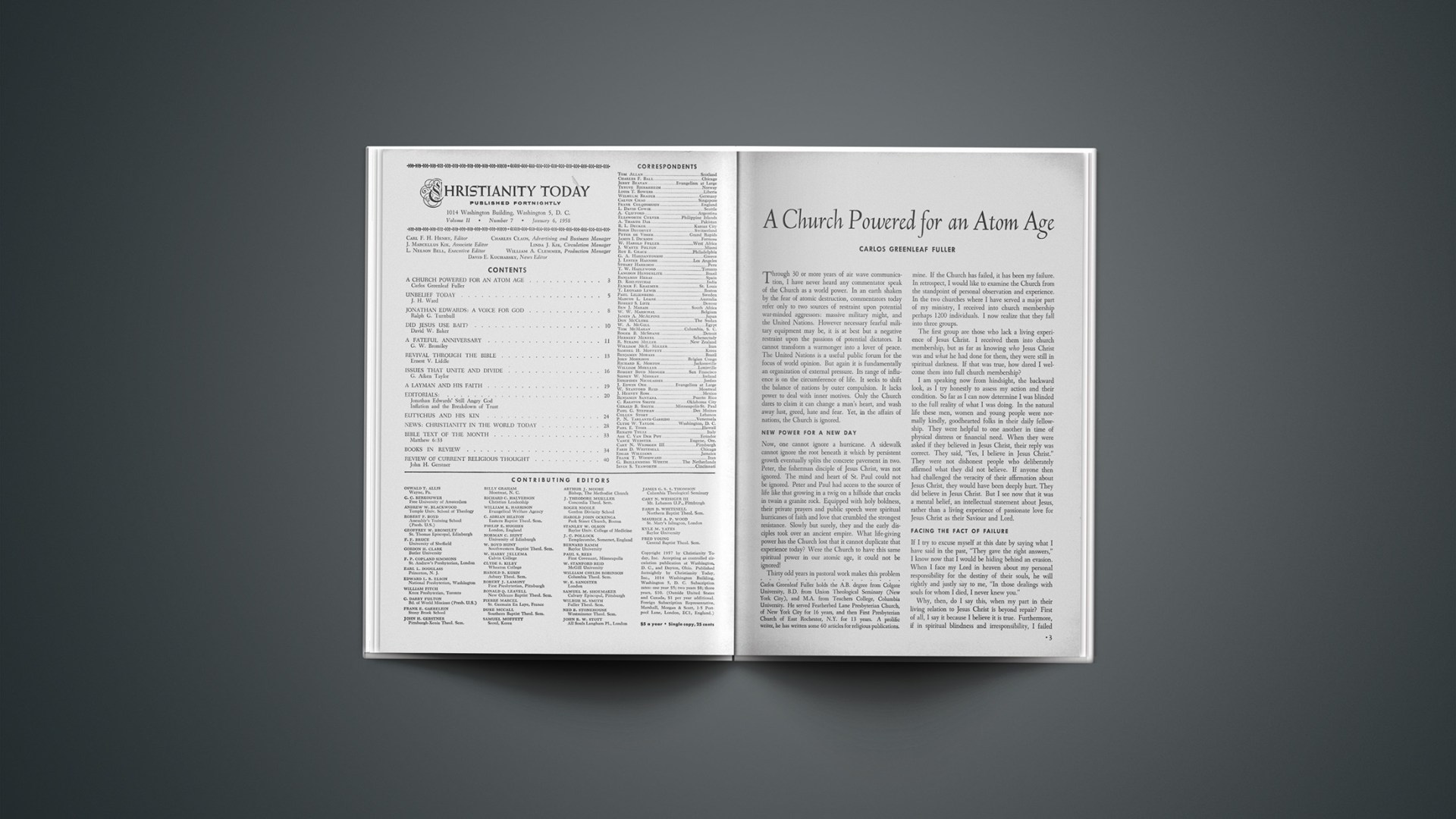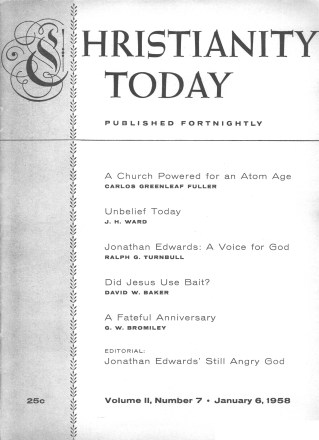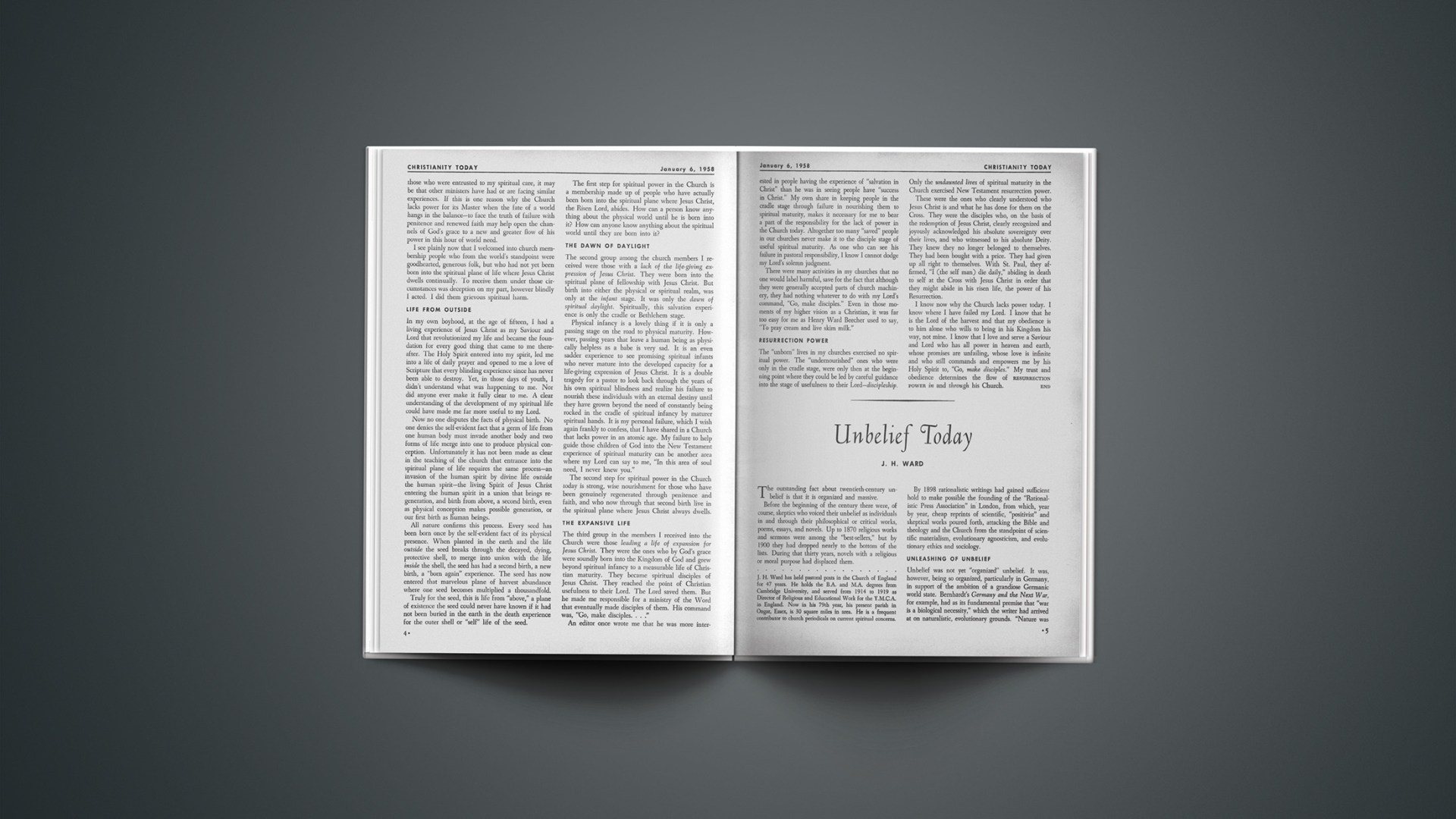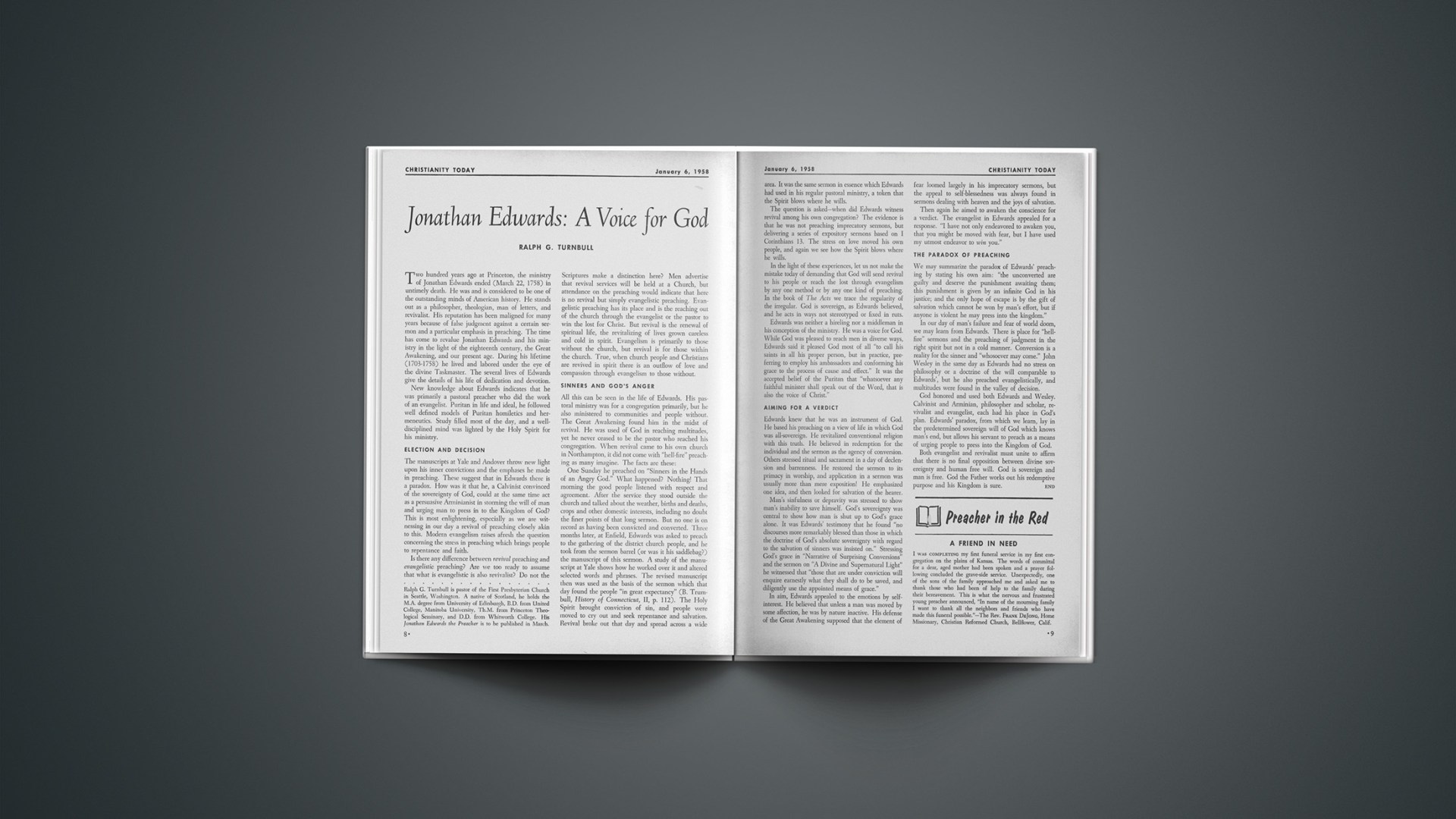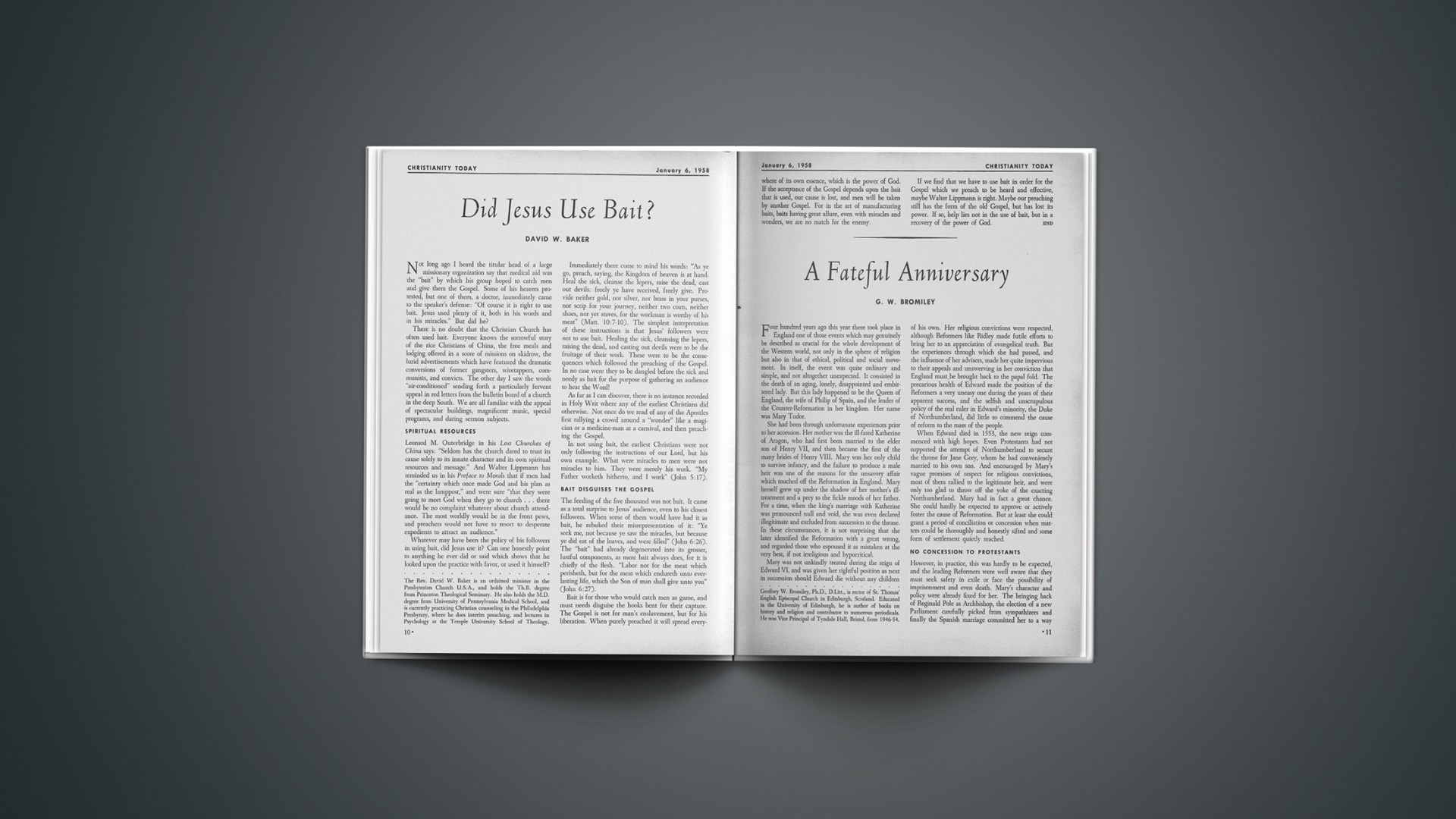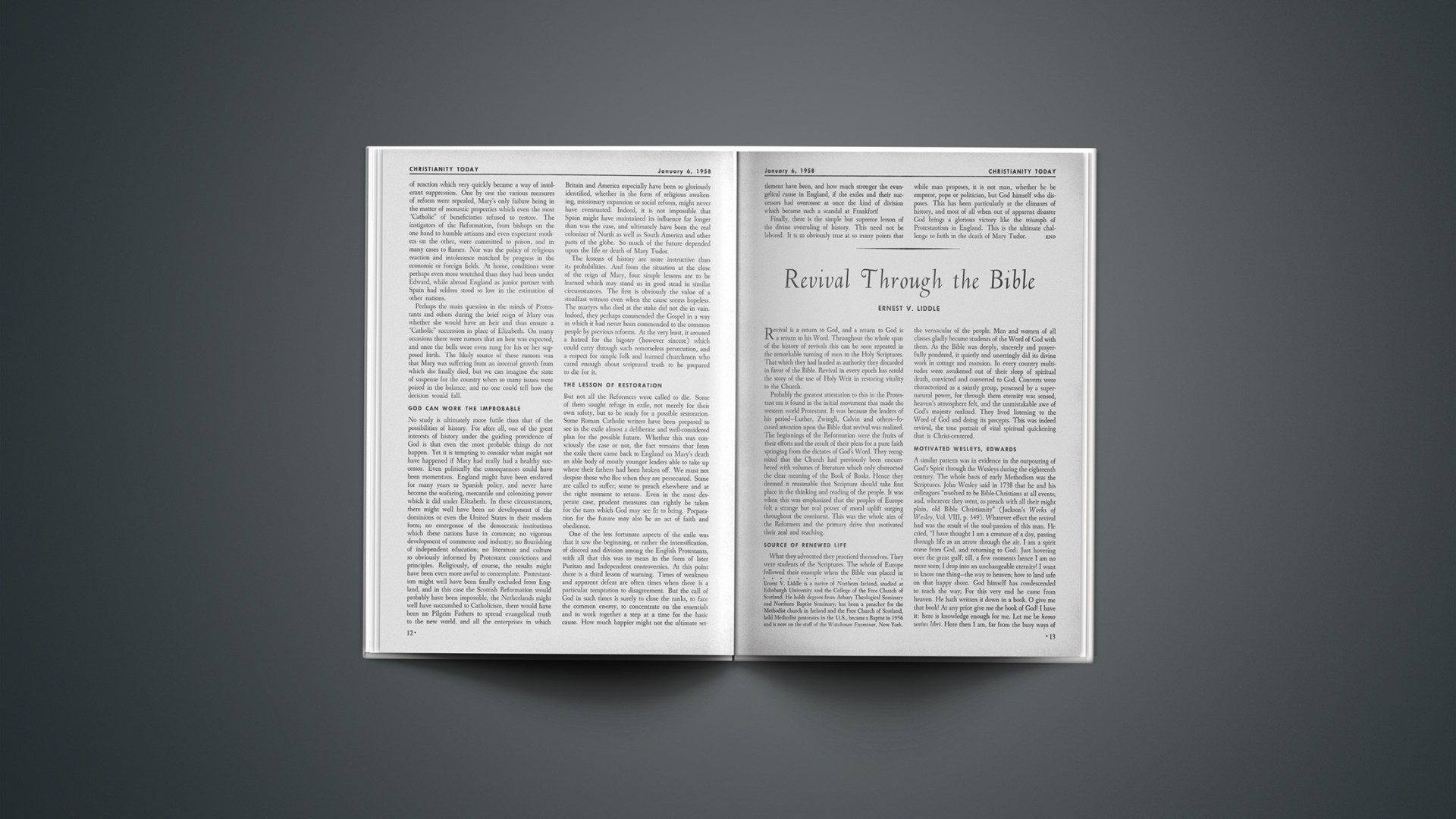Through 30 or more years of air wave communication, I have never heard any commentator speak of the Church as a world power. In an earth shaken by the fear of atomic destruction, commentators today refer only to two sources of restraint upon potential war-minded aggressors: massive military might, and the United Nations. However necessary fearful military equipment may be, it is at best but a negative restraint upon the passions of potential dictators. It cannot transform a warmonger into a lover of peace. The United Nations is a useful public forum for the focus of world opinion. But again it is fundamentally an organization of external pressure. Its range of influence is on the circumference of life. It seeks to shift the balance of nations by outer compulsion. It lacks power to deal with inner motives. Only the Church dares to claim it can change a man’s heart, and wash away lust, greed, hate and fear. Yet, in the affairs of nations, the Church is ignored.
New Power For A New Day
Now, one cannot ignore a hurricane. A sidewalk cannot ignore the root beneath it which by persistent growth eventually splits the concrete pavement in two. Peter, the fisherman disciple of Jesus Christ, was not ignored. The mind and heart of St. Paul could not be ignored. Peter and Paul had access to the source of life like that growing in a twig on a hillside that cracks in twain a granite rock. Equipped with holy boldness, their private prayers and public speech were spiritual hurricanes of faith and love that crumbled the strongest resistance. Slowly but surely, they and the early disciples took over an ancient empire. What life-giving power has the Church lost that it cannot duplicate that experience today? Were the Church to have this same spiritual power in our atomic age, it could not be ignored!
Thirty odd years in pastoral work makes this problem mine. If the Church has failed, it has been my failure. In retrospect, I would like to examine the Church from the standpoint of personal observation and experience. In the two churches where I have served a major part of my ministry, I received into church membership perhaps 1200 individuals. I now realize that they fall into three groups.
The first group are those who lack a living experience of Jesus Christ. I received them into church membership, but as far as knowing who Jesus Christ was and what he had done for them, they were still in spiritual darkness. If that was true, how dared I welcome them into full church membership?
I am speaking now from hindsight, the backward look, as I try honestly to assess my action and their condition. So far as I can now determine I was blinded to the full reality of what I was doing. In the natural life these men, women and young people were normally kindly, goodhearted folks in their daily fellowship. They were helpful to one another in time of physical distress or financial need. When they were asked if they believed in Jesus Christ, their reply was correct. They said, “Yes, I believe in Jesus Christ.” They were not dishonest people who deliberately affirmed what they did not believe. If anyone then had challenged the veracity of their affirmation about Jesus Christ, they would have been deeply hurt. They did believe in Jesus Christ. But I see now that it was a mental belief, an intellectual statement about Jesus, rather than a living experience of passionate love for Jesus Christ as their Saviour and Lord.
Facing The Fact Of Failure
If I try to excuse myself at this date by saying what I have said in the past, “They gave the right answers,” I know now that I would be hiding behind an evasion. When I face my Lord in heaven about my personal responsibility for the destiny of their souls, he will rightly and justly say to me, “In those dealings with souls for whom I died, I never knew you.”
Why, then, do I say this, when my part in their living relation to Jesus Christ is beyond repair? First of all, I say it because I believe it is true. Furthermore, if in spiritual blindness and irresponsibility, I failed those who were entrusted to my spiritual care, it may be that other ministers have had or are facing similar experiences. If this is one reason why the Church lacks power for its Master when the fate of a world hangs in the balance—to face the truth of failure with penitence and renewed faith may help open the channels of God’s grace to a new and greater flow of his power in this hour of world need.
I see plainly now that I welcomed into church membership people who from the world’s standpoint were goodhearted, generous folk, but who had not yet been born into the spiritual plane of life where Jesus Christ dwells continually. To receive them under those circumstances was deception on my part, however blindly I acted. I did them grievous spiritual harm.
Life From Outside
In my own boyhood, at the age of fifteen, I had a living experience of Jesus Christ as my Saviour and Lord that revolutionized my life and became the foundation for every good thing that came to me thereafter. The Holy Spirit entered into my spirit, led me into a life of daily prayer and opened to me a love of Scripture that every blinding experience since has never been able to destroy. Yet, in those days of youth, I didn’t understand what was happening to me. Nor did anyone ever make it fully clear to me. A clear understanding of the development of my spiritual life could have made me far more useful to my Lord.
Now no one disputes the facts of physical birth. No one denies the self-evident fact that a germ of life from one human body must invade another body and two forms of life merge into one to produce physical conception. Unfortunately it has not been made as clear in the teaching of the church that entrance into the spiritual plane of life requires the same process—an invasion of the human spirit by divine life outside the human spirit—the living Spirit of Jesus Christ entering the human spirit in a union that brings regeneration, and birth from above, a second birth, even as physical conception makes possible generation, or our first birth as human beings.
All nature confirms this process. Every seed has been born once by the self-evident fact of its physical presence. When planted in the earth and the life outside the seed breaks through the decayed, dying, protective shell, to merge into union with the life inside the shell, the seed has had a second birth, a new birth, a “born again” experience. The seed has now entered that marvelous plane of harvest abundance where one seed becomes multiplied a thousandfold.
Truly for the seed, this is life from “above,” a plane of existence the seed could never have known if it had not been buried in the earth in the death experience for the outer shell or “self” life of the seed.
The first step for spiritual power in the Church is a membership made up of people who have actually been born into the spiritual plane where Jesus Christ, the Risen Lord, abides. How can a person know anything about the physical world until he is born into it? How can anyone know anything about the spiritual world until they are born into it?
The Dawn Of Daylight
The second group among the church members I received were those with a lack of the life-giving expression of Jesus Christ. They were born into the spiritual plane of fellowship with Jesus Christ. But birth into either the physical or spiritual realm, was only at the infant stage. It was only the dawn of spiritual daylight. Spiritually, this salvation experience is only the cradle or Bethlehem stage.
Physical infancy is a lovely thing if it is only a passing stage on the road to physical maturity. However, passing years that leave a human being as physically helpless as a babe is very sad. It is an even sadder experience to see promising spiritual infants who never mature into the developed capacity for a life-giving expression of Jesus Christ. It is a double tragedy for a pastor to look back through the years of his own spiritual blindness and realize his failure to nourish these individuals with an eternal destiny until they have grown beyond the need of constantly being rocked in the cradle of spiritual infancy by maturer spiritual hands. It is my personal failure, which I wish again frankly to confess, that I have shared in a Church that lacks power in an atomic age. My failure to help guide those children of God into the New Testament experience of spiritual maturity can be another area where my Lord can say to me, “In this area of soul need, I never knew you.”
The second step for spiritual power in the Church today is strong, wise nourishment for those who have been genuinely regenerated through penitence and faith, and who now through that second birth live in the spiritual plane where Jesus Christ always dwells.
The Expansive Life
The third group in the members I received into the Church were those leading a life of expansion for Jesus Christ. They were the ones who by God’s grace were soundly born into the Kingdom of God and grew beyond spiritual infancy to a measurable life of Christian maturity. They became spiritual disciples of Jesus Christ. They reached the point of Christian usefulness to their Lord. The Lord saved them. But he made me responsible for a ministry of the Word that eventually made disciples of them. His command was, “Go, make disciples.…”
An editor once wrote me that he was more interested in people having the experience of “salvation in Christ” than he was in seeing people have “success in Christ.” My own share in keeping people in the cradle stage through failure in nourishing them to spiritual maturity, makes it necessary for me to bear a part of the responsibility for the lack of power in the Church today. Altogether too many “saved” people in our churches never make it to the disciple stage of useful spiritual maturity. As one who can see his failure in pastoral responsibility, I know I cannot dodge my Lord’s solemn judgment.
There were many activities in my churches that no one would label harmful, save for the fact that although they were generally accepted parts of church machinery, they had nothing whatever to do with my Lord’s command, “Go, make disciples.” Even in those moments of my higher vision as a Christian, it was far too easy for me as Henry Ward Beecher used to say, “To pray cream and live skim milk.”
Resurrection Power
The “unborn” lives in my churches exercised no spiritual power. The “undernourished” ones who were only in the cradle stage, were only then at the beginning point where they could be led by careful guidance into the stage of usefulness to their Lord—discipleship. Only the undaunted lives of spiritual maturity in the Church exercised New Testament resurrection power.
These were the ones who clearly understood who Jesus Christ is and what he has done for them on the Cross. They were the disciples who, on the basis of the redemption of Jesus Christ, clearly recognized and joyously acknowledged his absolute sovereignty over their lives, and who witnessed to his absolute Deity. They knew they no longer belonged to themselves. They had been bought with a price. They had given up all right to themselves. With St. Paul, they affirmed, “I (the self man) die daily,” abiding in death to self at the Cross with Jesus Christ in order that they might abide in his risen life, the power of his Resurrection.
I know now why the Church lacks power today. I know where I have failed my Lord. I know that he is the Lord of the harvest and that my obedience is to him alone who wills to bring in his Kingdom his way, not mine. I know that I love and serve a Saviour and Lord who has all power in heaven and earth, whose promises are unfailing, whose love is infinite and who still commands and empowers me by his Holy Spirit to, “Go, make disciples.” My trust and obedience determines the flow of RESURRECTION POWER in and through his Church.
Carlos Greenleaf Fuller holds the A.B. degree from Colgate University, B.D. from Union Theological Seminary (New York City), and M.A. from Teachers College, Columbia University. He served Featherbed Lane Presbyterian Church, of New York City for 16 years, and then First Presbyterian Church of East Rochester, N.Y. for 13 years. A prolific writer, he has written some 60 articles for religious publications.

